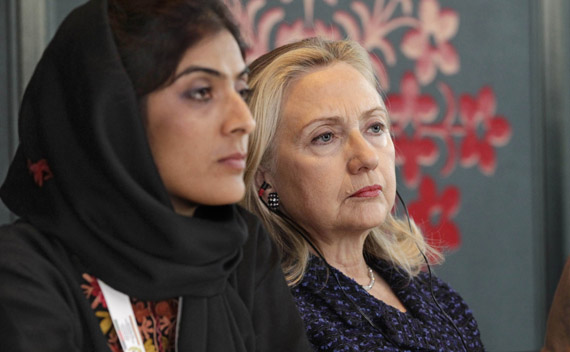New U.S. Plan for Women in Armed Conflicts
More on:

Yesterday, the White House released its first-ever National Action Plan (NAP) on Women, Peace, and Security. The United States is the thirty-third nation to publish a NAP in order to implement the 2000 UN Security Council Resolution (UNSCR) 1325 on women and conflict. As I argued one month ago here, it is vital to better integrate women into post-conflict negotiations for a number of reasons. Secretary of State Hillary Clinton echoed these sentiments when the White House released the plan:
From Northern Ireland to Liberia to Nepal and many places in between, we have seen that when women participate in peace processes, they focus discussion on issues like human rights, justice, national reconciliation, and economic renewal that are critical to making peace, but often are overlooked in formal negotiations. They build coalitions across ethnic and sectarian lines, and they speak up for other marginalized groups. They act as mediators and help to foster compromise. And when women organize in large numbers, they galvanize opinion and help change the course of history.
The plan outlines strategies for the United States to implement UNSCR 1325, by infusing U.S. government efforts to promote peace with a heightened awareness of the importance of women in peacebuilding. The U.S. Department of Defense and Department of State, Agency for International Development (USAID), as well as civil society consultants contributed to its drafting. The NAP lists five areas in which the United States will “redouble” its efforts in the words of Secretary Clinton:
- Increased awareness at home: Women’s role in peacebuilding is often underemphasized—not only abroad but also in the United States. Therefore, the plan commits the U.S. government to improve professional training, interagency coordination, and policy development and incorporate a gender-responsive approach into U.S. diplomatic and defense policy.
- Partner with women in at-risk communities or regions to prevent conflict. The plan pledges that the United States will “invest in early warning systems that incorporate gender analysis and monitor increases in violence and discrimination against women, which can be indicators of future conflict.” It also adds that the United States will “support grassroots women’s organizations that work to stop violence and promote peace.”
- Increase protection for women. Since women are uniquely affected by armed conflict, the plan vows to help “build the capacity of foreign militaries, police forces, and justice systems to strengthen the rule of law and ensure that protecting civilians and stopping sexual and gender-based violence in particular is a shared priority.” Furthermore, the United States is cooperating with the UN to recruit more female peacekeepers as well as better train UN forces to “prevent, predict, and react to” violence against women.
- Expand women’s political participation. Women’s political involvement has been shown to “shape stronger and more durable agreements” as described above. Secretary Clinton added a note of humor with one anecdote about male negotiators in Darfur who could not agree on rights to a particular river. The stalemate ended when women, who fetch water and wash laundry in the river, pointed out that the river had already dried up.
- Provide adequate assistance to women during recovery. Intense violence typically creates searing and protracted humanitarian crises, and the failure to move in the early stages of recovery can destabilize peace processes. Women often suffer disproportionately during these periods, as assistance is often showered on foreign combatants at the expense of victims—dynamics that hamper the crucial contributions women might otherwise make to peacebuilding.
All this attention to women in peace-building may strike some national security traditionalists—who tend to be overwhelmingly male—as special pleading. But the lessons of hard experience are clear. The achievement of sustainable security—that is, human security—requires not only controlling the men with guns but empowering the women who will serve—as they always have—as the anchors of societal stability. The NAP is grounded in sober realism—and should accordingly be celebrated.
More on:
 Online Store
Online Store